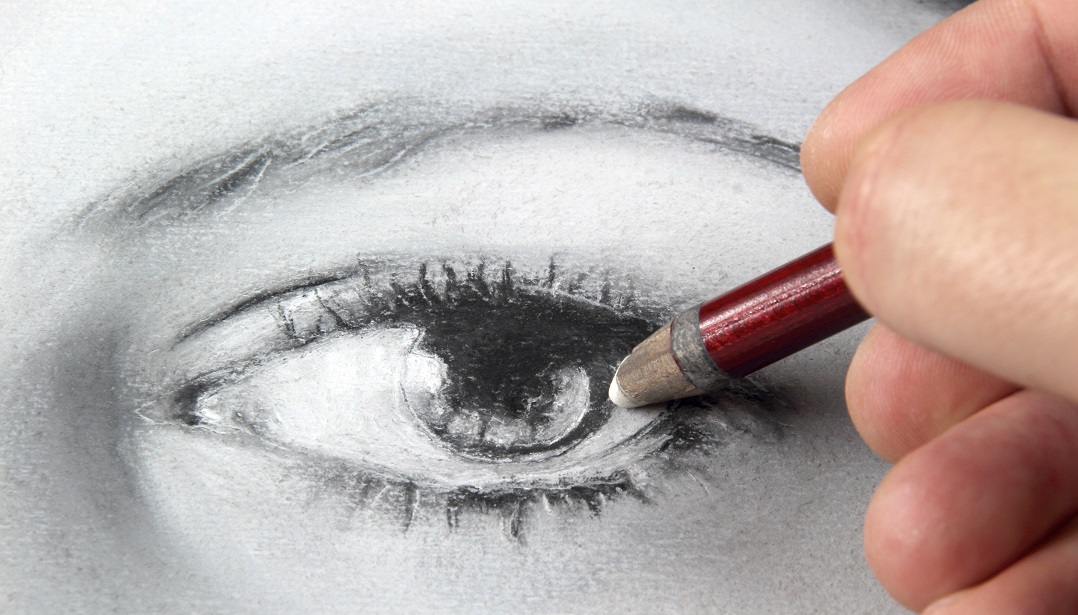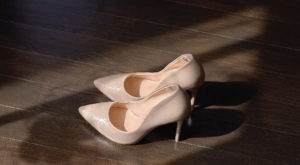The Newlywed Game


I
am a woman, at last.
I look at my face, enveloped by the wavy brown sheitel. The wig frames my narrow cheekbones; the pony masks my too-high forehead. I turn my head from side to side and enjoy the swish of the silken mane. I look like any other young woman, young married woman.
“How much is this one?” I ask.
“Ah, you chose one of our best pieces. A hundred percent European hair, soft and silky. You have good taste.”
Many would suck in their breath when she names the figure; I don’t. I’m prepared for the expense. I’ve been waiting for this day for years, too many years to count. Not this way, no, my dreams were more fantastic, but this will have to do.
“I’ll take it,” I say. “When will it be ready?”
“Wonderful! This sheitel is meant for you! It fits you like a glove. Just a wash, we’ll give it. Do you want us to curl it? Many kallos like curls, for the sheva brachos.”
“No, the natural waves will be fine. But when will it be ready?”
“Don’t worry, sweetie, you’ll have it in plenty of time for your wedding. It’s in Sivan, after Shavuos, no?”
Shavuos will be too late for my flight. I think quickly.
“Lag B’Omer,” I say. “I’m getting married on Lag B’Omer, I’ll want to pick it up before that.”
“Ah, a short engagement.” Ruchi the sheitelmacher smiles. “No patience, ah.”
Who is she to speak of patience? She looks like a teenager still, and is obviously showing. She probably got married right after seminary.
“No, you could say my patience has run out.”
I look solemn as I speak, not as a blushing bride should be. Ruchi gives a nervous giggle.
What does a married woman need?
Not much, it turns out. Not much more than a wig and a ring.
There is a jewelry store on my block, but a heimishe store will expect me to come on this important mission with my chassan, or at least my future shvigger. It’s simpler to drive across town, to the mall, a large cement and glass structure where nobody knows or cares that a bride is resorting to shopping by herself.
Gold glitters in the window. I never used to go into stores like these. Gold and pearls were not meant for me. When I needed new earrings, I went to a costume jewelry store and bought cheap colored-glass flowers set in copper. They felt less like real jewelry. Because jewelry is something a husband buys. That principle was deeply engrained in my psyche, despite my friends telling me I was being ridiculous and old-fashioned.
I stare into the window now, at trinkets laid out on blue velvet, ready and waiting for an adoring husband or a starry-eyed girl. I am neither, but I step closer, and the glass doors slide open, triggered by a sensor.
“How can I help you?” A man is standing behind the counter, short and dark-skinned with white hair growing in random tufts.
“I need a wedding ring.”
“Yellow gold or white?”
“White.” I decided on white gold in tenth grade, when Chumi and I planned our weddings in the back of my Chumash notebook. White gold goes better with diamonds.
He lays a tray of rings on the counter in front of me. I pick up a plain band, slip it on my finger. It feels good.
“I need an engagement ring, too,” I say.
“Diamonds or cubic zirconia?”
I want to tell him diamonds, but I say, “CZ.”
I choose a simple ring, a plain setting with a small round stone.
The rings both fit me perfectly, they don’t need adjusting. That’s me, good old Ravi, even my fingers are average.
He adds up the figures. I open my purse to pull out my credit card.
“Will you want an engraving?” he asks.
“A what?”
“An engraving on the inside of the ring. A line of poetry or something. Lots of couples are into that nowadays.”
“Oh. No. That’s okay, thanks.” I try to smile.
I stride into the shul hall, confident in my favorite beige suit. My high-heeled shoes match perfectly. When you’ve been in shidduchim as long as I have, you learn to put together a chic outfit. I’m no longer the shy seminary girl on her first date. Some would say the change came too late, but at least now I can enjoy it, and there are no pitying glances. I lean forward to pour myself a drink and stand, twirling the cup in my hand, ever conscious of the new sheitel swaying at my shoulders. I’ve flown halfway around the globe to be able to wear it.
I not only covered my ponytail. I covered my lack, my loss. I’m not poor Ravi anymore. I’m Liora Avigail Cohen, a married woman. The name Ravi stuck with me since kindergarten, but finally I’m rid of it, starting a new life with the new name.
A young woman, Dina, comes over to me. She had introduced herself as we were going into shul.
“Good Shabbos, Liora. Did you enjoy?”
“It was lovely,” I say. “So spiritual.” I’m telling the truth. Finally I can daven without feeling eyes in my back and whispers in the corners, checking how much I sway and how many tears I shed. Finally I can walk out of shul without well-meaning women coming over to tell me that they pray for me and that my pleas can open the gates of heaven.
“I’m so glad you liked it! We’re really excited about having a new family in our community. I’ve been telling Tziporah and Yael all about you. Come, I’ll introduce you to them.”
Soon I’m standing right in the middle of a circle of women. They all seem genuinely happy to meet me.
If we’d met a short while ago, they’d be throwing me pitying glances, and I’d be giving my best put-together-and-not-desperate-yet-desperately-in-need-of-a-shidduch performance. I love the sensation of freedom, freedom tinged with fear.
“Where’s your husband? Dovid you said his name was? Yitz has to meet him,” says Tziporah. The question I’ve been preparing for ever since I set this plan into action. This is the real test.
“He needs to sort out some stuff back home,” I say, keeping my voice casual. “Work stuff, you know.… I came ahead to get the house ready.”
“Oh my! You poor thing. All alone for Shabbos! You have to come over to us! Don’t worry, Yitz always tells me off for making way too much cholent.”
“I couldn’t,” I say, and then let Tziporah persuade me. Test number one passed successfully. They aren’t the least bit suspicious. Why should they be?
I know her as soon as I see her. My height, but wearing uncomfortable-looking heels that add a few inches. Dark brown hair falls to her shoulders in straight strands, frizzy from too much blow drying. She’s wearing beige tights, a short black skirt with beaded pink flowers, and a matching pink button-down sweater.
Dina sees me looking her way. “Simi Berkowitz,” she whispers. “Nebach, poor girl.”
I nod. That used to be me.
“Such a shame,” she continues, “but what can we do? Levi’s friends are all married, of course. I did try suggesting her someone once. Oh, so what did you say the dressing is for your strawberry salad?”
I want to go over to her. But what can I say? “Hi Simi, can we be friends? I know what you’re going through. Maybe we can hang out some evening?” Yeah right, like I can do that. I made my choice. I look down at the shining rings on my finger.
“Some orange juice, a drop of honey.” I list the ingredients for my salad specialty.
This is the best decision I ever made.
Some of my life stayed the same. At work there are the familiar gray cubicles and standard issue computers. The blinds are always down, blocking the view outside. I could be back at headquarters, for all the difference it makes in the office. That’s global corporations for you.
And at home, well, they were right, I do miss Abba and Ima and my nieces and nephews popping in and out.
I chose an apartment that’s outside the Jewish neighborhood. I didn’t have a choice, I couldn’t risk surprise visitors and had to make sure no one could see who exactly is — or rather is not — coming and going. Sometimes, the loneliness hits me in a wave.
But when I go out — to the N’shei play, the Chinese auction, the simchahs, every Shabbos at shul — I live for those times.
Because finally I’m part of it. Part of the community.
“R
avi, Ravi Cohen!”
I spin around.
A tall, blonde woman is walking over to me. I’ve never seen her before, so how does she know my name, my real name? Have I been found out?
“You haven’t changed a bit. Why, as soon as I saw you I was like, there’s Ravi from Camp Ditza.”
I force my lips onto the semblance of a smile. She leans forward and air-kisses my cheek.
I still have no idea who she is. I’ve never been good at remembering names; an advantage when it came to dating — most boys’ names were forgotten a week after going out with them, my mind left a blank, fresh slate — but when it comes to female acquaintances, I wish I had a better memory.
“I don’t remember you being from around here.” A safe, neutral, response.
She laughs. “Yeah, who’d have thought that I’d end up so far from sunny LA. Life can sure be surprising. And what brought you to this neck of the woods?”
Camp Ditza, LA. The pieces click into place. Shoshy something-or-other. She slept in the bunk bed on top of mine, and she got the most points at the bowling alley at night activity. Hopefully she’s not in touch with the other girls.
“Warm community, a job nearby, the usual.” I try to sound confident.
“And don’t forget the great schools,” she says with a smile.
“I don’t have kids yet, we’ve only been married a year or so.” My voice trails off.
She knows how old I am, she knows what stage of life I should be in, if my life went according to pattern, but she hides her surprise well; I’ve got to give her that. “Oh, newlyweds, so cute. It’s a great period, enjoy it!”
“Great meeting you, we have to get together sometime!” I say in a breezy voice, inside wishing that she stay far, far, away from me in my new life.
The door bangs shut behind me. “I’m home.” I call out. I know there’s nobody to hear me, but I speak anyway, in my new nighttime ritual.
I drop my purse on the floor, kick off my shoes. The apartment is a mess, but who cares? I take off my sheitel and carefully place it on the foam head. I stare at myself in the mirror, no costume now, just my familiar frizzy ponytail.
If only there really was a Dovid. If only I really did have a husband.
How long can I last here, before they get suspicious? How long can I claim my husband is away for business, or sick, or davening in the local shtiebel? When is Shoshy what’s-her-name going to call our old friends from Camp Ditza and do the “guess-who-I-bumped-into” routine and discover that Ravi never did get married, such a sad story?
I’ll stay as long as I can, and then I’ll move, take off, disappear. Maybe I’ll try again, somewhere else, somewhere further away. Maybe I’ll have to go back to my old life.
But whatever happens, I know one thing. It was worth it.
For this short, wonderful period, I belonged.
(Originally featured in Calligraphy, Pesach 5772)
Oops! We could not locate your form.












